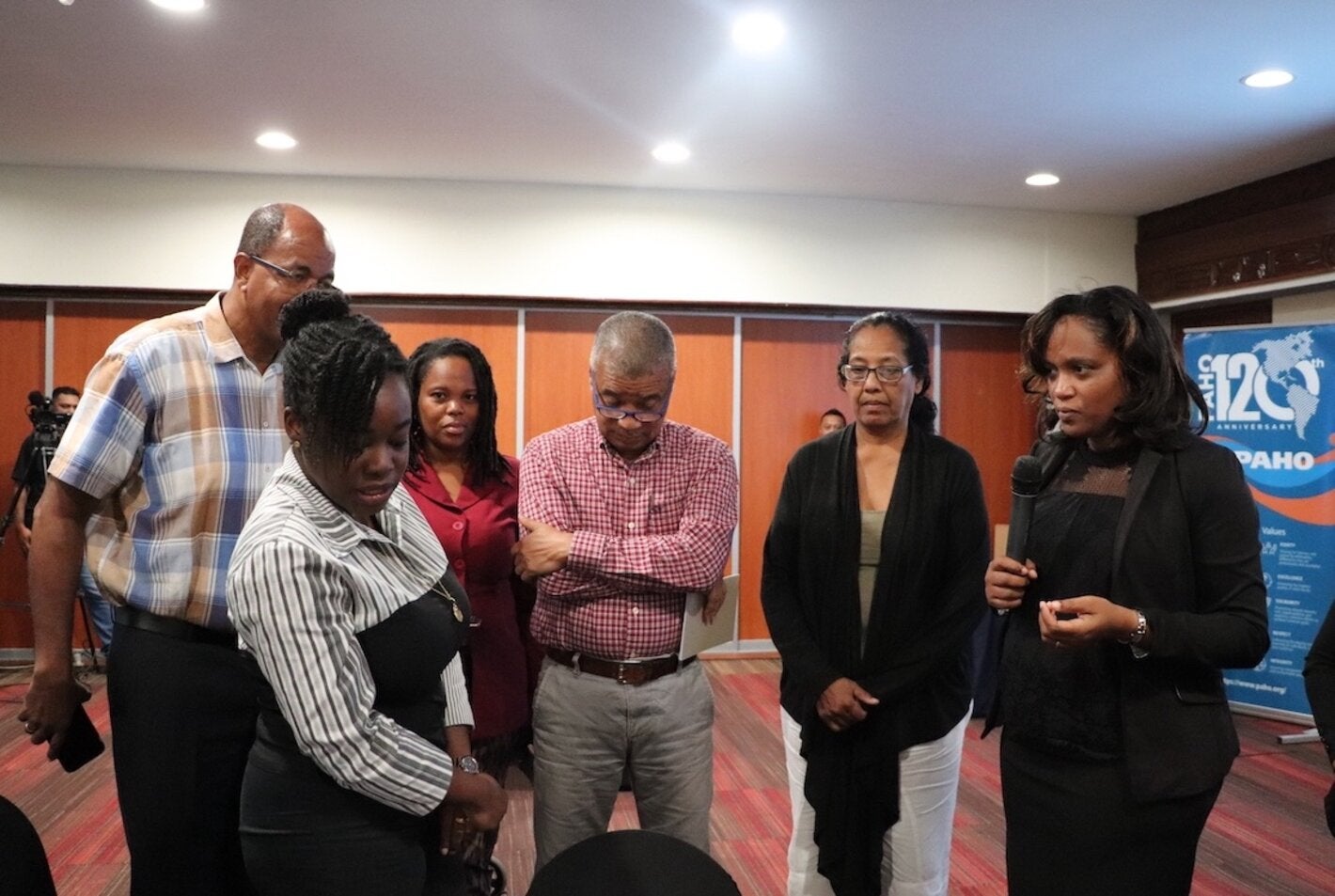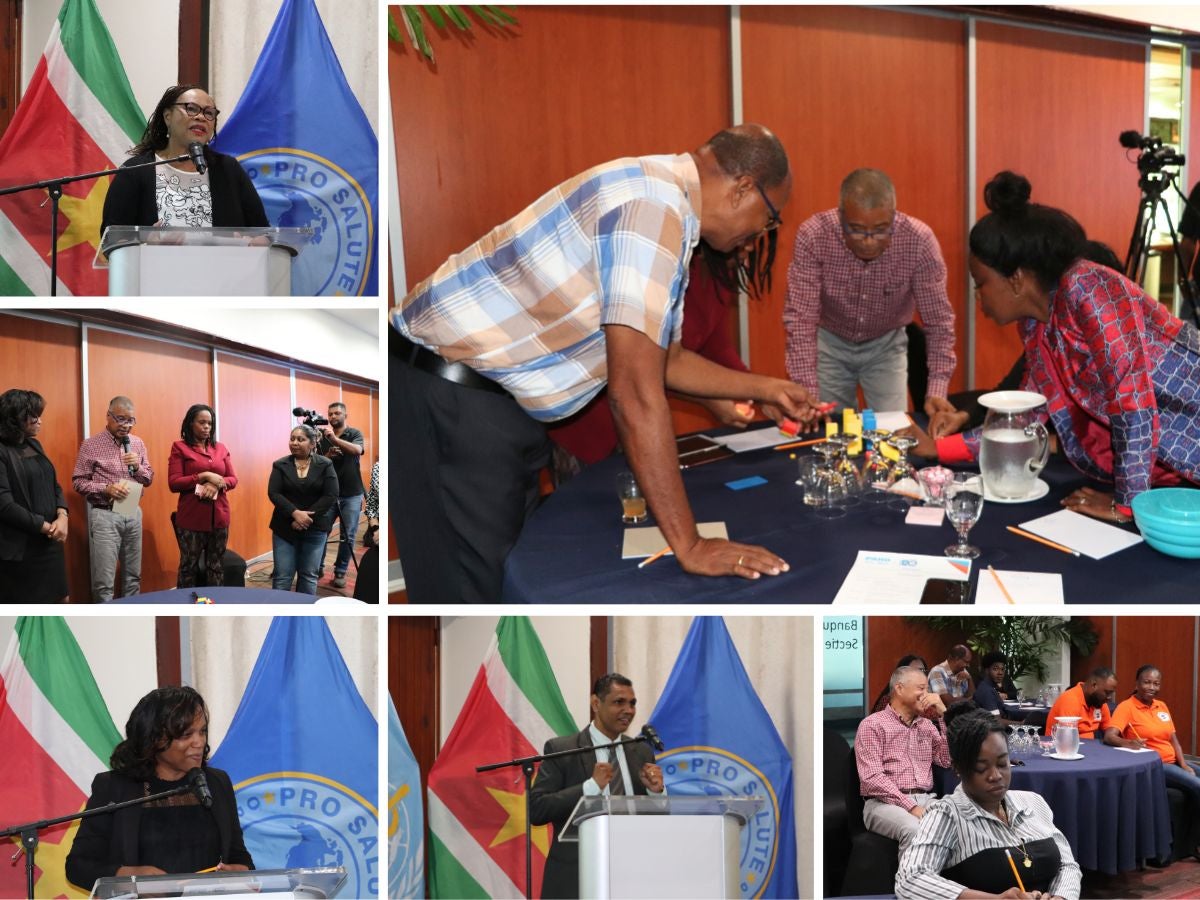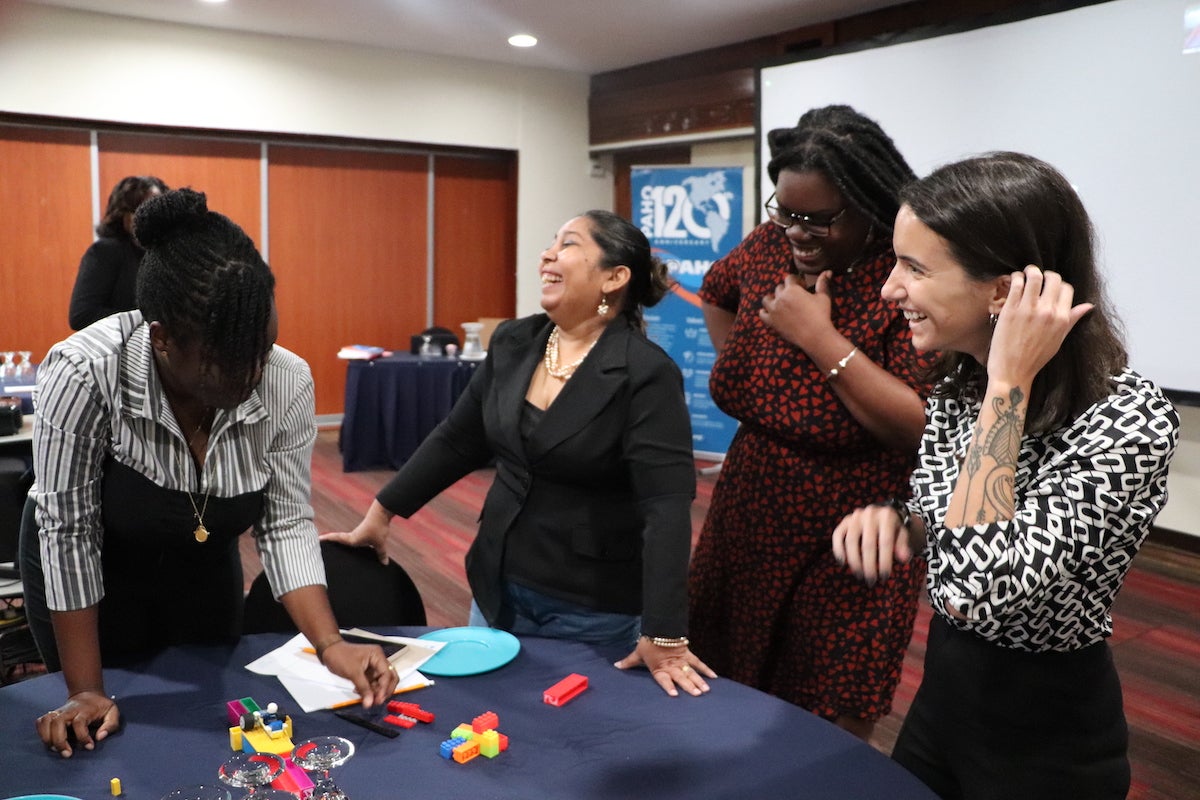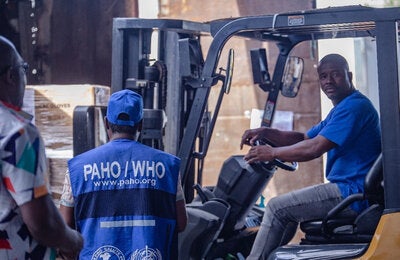
PAHO/WHO Suriname Technical Officer Dr. Wendy Emanuelson-Telgt interacting with several participants during the 2-day workshop
Suriname, July 20, 2023 (PAHO/WHO) –The Pan American Health Organization (PAHO) in collaboration with the Ministry of Health Suriname, successfully conducted a Health Promotion Workshop on July 19-20. The workshop aimed to tackle the escalating Non-Communicable Disease (NCD) epidemic in the country through a global, political, and social process that focuses on modifying social, environmental, and economic conditions to have a positive impact on individual and collective health.
This workshop is an integral part of a broader trajectory of PAHO's technical support to the Ministry of Health (MoH) in their endeavor to develop MoH’s Health Promotion Plan. Through this collaborative effort, PAHO aims to provide expertise, guidance, and resources to assist the MoH in formulating a comprehensive and effective plan for promoting health and well-being in Suriname.
Suriname, like many other countries in the Region, faced a significant challenge due to Non-Communicable Diseases, which have placed immense pressure on the healthcare system. According to the Suriname NCD & MH Investment case conducted in 2021, a staggering 78% of all deaths in Suriname were attributed to NCDs, with cardiovascular disease being the leading cause of death.
PAHO/WHO Representative, Dr. Noreen Jack, officially opened the workshop, emphasizing the significance of collaborative efforts in combatting the NCD crisis in Suriname
As we gather here today for this significant health promotion workshop, organized as part of PAHO's commitment to supporting the Ministry of Health, we firmly believe that modifying social, environmental, and economic conditions can undoubtedly impact the determinants of health in Suriname. Over the next two days, we will explore the significance of health promotion, analyzing regional milestones and the current state of health promotion initiatives within the country. This workshop stands as a dynamic platform for open dialogue, idea exchange, and collaborative efforts to develop effective strategies and presentations, all geared towards bolstering health promotion efforts and laying the groundwork for improved individual and collective health in Suriname. - PAHO/WHO Representative, Suriname Dr. Noreen Jack
During the Health Promotion Workshop, participants from various ministries, and community organizations came together to explore the importance of health promotion in Suriname. They engaged in insightful discussions about regional milestones and examined the current state of health promotion initiatives in the country.
The workshop provided an ideal platform for attendees to work collaboratively in small groups, as they reflected on the concept and actions of Health Promotion, in the framework of the Strategy and Plan of Action on health promotion in the context of the SDGs 2019-2030, explored current action being taken in Health Promotion in Suriname and build a strong argument in favor of Health Promotion and apply this to the key health priorities of the Ministry of Health.
Director of Health, Ministry of Health Dr. Rakesh Gajadhar Sukul, representing the Ministry of Health, Suriname expressed the Ministry's commitment to addressing the NCD epidemic and scaling up the response to prevent further health challenges in the country.
Health promotion is of importance in raising awareness about adopting a healthy lifestyle and we need individuals who will further spread this message, encouraging people to adopt healthier habits, including better dietary choices and regular physical activity. While promoting a healthy lifestyle poses challenges; it involves the entire society, including those involved in food production, who can also be stimulated to promote healthier alternatives. Health education plays a crucial role in this process.
Health promotion, in essence, involves facilitating behavioral changes, often through government interventions, making it easier for individuals to accept and embrace healthier patterns of living. - Director of Health, Ministry of Health Dr. Rakesh Gajadhar Sukul
During the health promotion workshop, Dr. Pilar Campos, Regional Advisor of Health Promotion from PAHO/WHO headquarters (virtually) delivered a presentation on the regional milestones of health promotion in the region. Her insights shed light on successful initiatives and strategies implemented across the area to promote better health and well-being.
Additionally, Dr. Helyn Silva, International consultant of health promotion from PAHO/WHO headquarters conducted a highly engaging hands-on activity during which the audience collaborated in small groups to create a comprehensive map of the ongoing health promotion efforts in Suriname. This interactive exercise allowed participants to identify existing initiatives, assess their effectiveness, and explore opportunities for further improvements in health promotion within the country. The activity fostered valuable discussions and laid the groundwork for future collaborative endeavors in promoting a healthier Suriname.
During the second-day, through presentations and working groups they also contributed to deepening on the health promotion concept, intrinsically linked with the social determinants of health, their main values, and their actions.
Previous work in Suriname on the integration of SDH in NCDs within the framework of the BMG project was also reported by Dr Hugo Vasquez, International consultant of SDH from PAHO/WHO headquarters. The workshop successfully achieved its intended outcomes, including:
1. Enhancing participants' understanding of the burden of NCDs and their impact on different sectors.
2. Identifying the roles of different government departments in NCD prevention.
3. Exploring possibilities for intersectoral collaboration in health promotion efforts.
The Ministry of Health and PAHO/WHO, along with other key stakeholders, expressed their commitment to work together to implement the strategies and recommendations developed during the workshop.
PAHO/WHO and the Ministry of Health will continue their collaboration to curb the NCD epidemic in Suriname, promoting healthier settings and lifestyles, considering the social determinants of health, and enhancing overall public health in the country. As a continuation of this vital initiative, the Ministry of Health will organize a follow-up workshop involving a broader spectrum of stakeholders. This subsequent workshop aims to further assess and define the roles of various entities in health promotion throughout the country. The collective dedication and collaboration demonstrated during these workshops will undoubtedly pave the way for a comprehensive and impactful approach to promoting a healthier and more prosperous Suriname.





